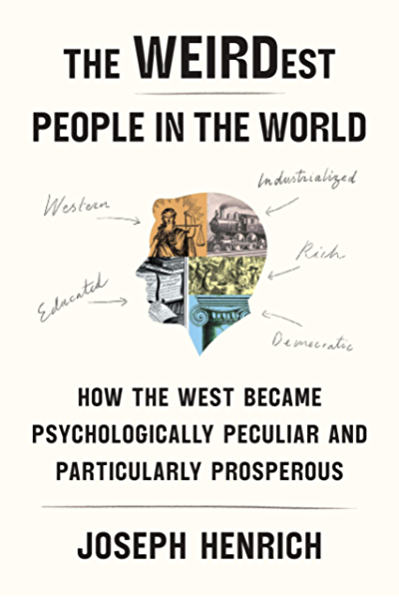Member-only story
Summary and Commentary on “The WEIRDest People in the World”

Joseph Henrich has written an overarching super-history book not unlike Yuval Harari’s Sapiens or Jared Diamond’s Guns, Germs and Steel. He attempts no less than to explain the causes for Europe’s rise from obscurity about 500 years ago to rapidly dominate the world. Along the way he shows how humans organized into clans and states, how the Catholic Church broke up kin-based societies, how Protestantism drove adaptations that led to the modern world, and how these adaptations have yielded a type of human that are psychologically and neurologically different from what had come before. He debunks the notion that there’s a universal human psychology.
He calls people like you and me WEIRD: Western, Educated, Industrialized, Rich and Democratic — not just for the tongue-in-cheek acronym, but also because we are in fact outliers relative to our ancestors. He illustrates the difference in people by exploring research into non-WEIRD societies, such as found in Papua New Guinea, the Amazon, and other less-Westernized peoples. He shows what we often take as foundational or self-evident, such as individual rights or the importance of intent, are actually relatively recent cultural ideas and in contrast to what mattered to most humans for the last 10,000 years! He constructs the path and mechanism of human cultural evolution, how it differed in Europe, and how that stymies development today.
A Literate Species
Mass literacy is relatively new, beginning in the Netherlands around 1650, such that by 1750, nearly 90% of the population was literate. Other European countries followed suit. (p. 8) In fact, “modern populations are neurologically and psychologically different from those found in societies throughout history.” (p. 6) This literacy also caused physiological changes among people, specifically:
- Modified our brains, developing the corpus callosum, ventral occipito-temporal region, prefrontal cortex and improved verbal memory.
- Shifted facial recognition to the right hemisphere.
- Reduced “holistic visual processing in favor of more analytical processing”. (p. 4)
Shockingly, Henrich shows that we have also broadly misunderstood human brains and psychology because most…